Internet Explorer 9 Platform Preview: Investigated
by Brian Klug on March 17, 2010 11:44 AM EST- Posted in
- Trade Shows
GPU Accelerated HTML5
The strongest bid IE 9 is trying to make against its competitors is that of superior, GPU-driven performance. For quite some time, the bar has been steadily raised in the JavaScript engine domain by continual competing releases of Chrome, Firefox, and Opera. However, HTML5 <video> asset tags mean that (should the standard catch on) browsers themselves (rather than plug-ins) will be a huge contributing factor for playback performance. Microsoft showed a rather compelling demo with two GPU-accelerated videos simultaneously playing back in the browser on a (ostensibly ION-based) netbook with minimal to no stutter. Surprisingly, HTML5 <video> is not enabled in the consumer preview out now. Microsoft offers a relatively curt explanation why:
"The demo of HTML5 <video> at MIX10 was a preview of a future release of the Platform Preview."
It's likely that there still are GPU vendor-specific issues that need to be worked on before they're comfortable releasing a build with support. Until then, it's impossible to really know how IE 9 HTML5 video playback stacks up against Chrome and Firefox's implementations.
In addition, they showcased the subpixel-rendering capabilities that they can leverage that other browsers still lack.
But the big performance boon comes for both 2D and 3D HTML5 display acceleration. One of the demos given the most stage presence during the keynote consisted of a grid of spinning browser logos nicknamed "spinning images." It represents what Microsoft considers an ideal showcase for the dramatic performance increases possible with GPU accelerated graphics in-browser. I went ahead and decided to run my own tests across a number of browsers. Pay attention to image quality as well.
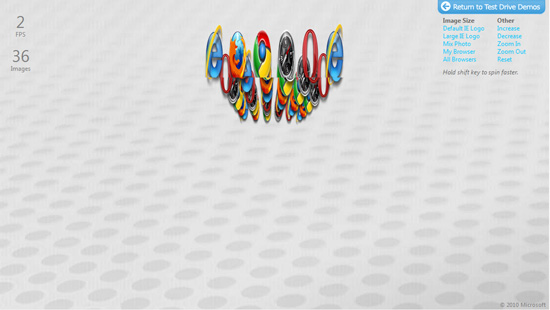
First up is IE 8, which struggled to render a mere 1-2 FPS. You can see the banding which was evident virtually the entire time. Image quality, however, is good.
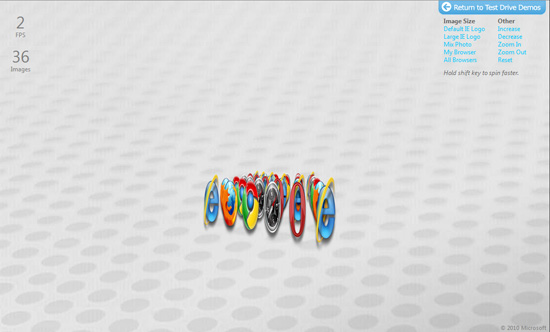
Next up is Safari 4.0.4. Image quality of the scaled logos in the extreme back and far front is likewise very good, however Safari too struggles to render more than 2-3 FPS.
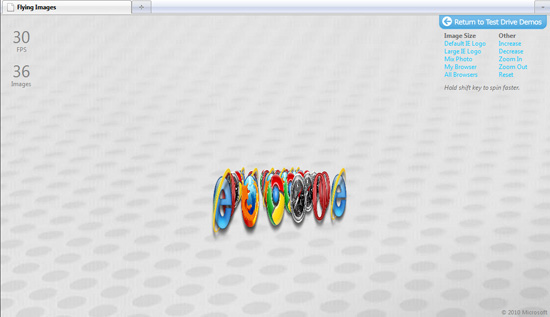
Next, Firefox 3.6. Performance here is dramatically better than Safari or IE 6, however look at the images in the extreme background and extreme foreground. There's obvious image-degrading nearest-neighbor downsampling going on, resulting in horribly blocky logos. Performance is more than acceptable, but comes at the price of quality.
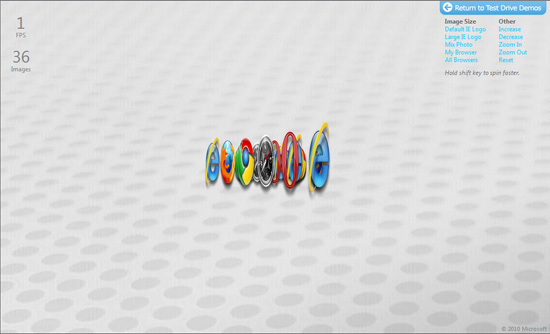
Chrome's performance is surprisingly bad given its stellar reputation for performance, but unsurprising given the poor performance of its WebKit brethren, Safari. Again, image quality is very good, likely at the cost of performance.
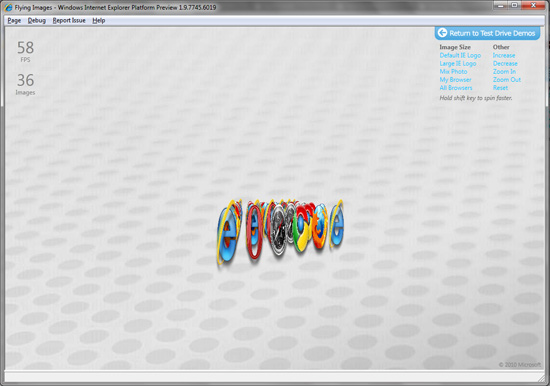
Finally, IE 9 Platform Preview gives the highest performance yet, at around 58-60 FPS. At the same time however, image quality sits somewhere between Firefox 3.6 and Safari/Chrome/IE 8. It's obvious that there's some downsampling here that isn't 100% quality-friendly, however, there's significantly less blocking. Detail is still a bit strange inside the black Safari logo.
Obviously, we have to take these results with a bit of skepticism; the IE team has had the time to optimize their platform preview to the technology demo they saw think shows off their platform best. That said, there are clear and obvious performance benefits to be had from GPU acceleration in the browser.
It hasn't been made entirely clear what system requirements are necessary for GPU accelerated content, however, they're apprently enough to completely preclude Windows XP from running IE 9 platform preview. Integration is likely tied to Windows Display Driver Model (WDDM) given the strict Windows Vista (with a platform update) or Windows 7 requirement.
Final Words
Whatever the case, it's obvious that Microsoft has heard developers plea for improved standards compliance and dramatic performance improvements across what remains the world's largest browser platform. Microsoft has been acting a lot like Google or Apple lately, evidenced through an open feedback platform preview such as IE 9, and showing an awareness for the seriousness of both its competitors browser and mobile device offerings.










60 Comments
View All Comments
opalfroot - Monday, March 22, 2010 - link
I find it hard to get excited about something like this - I mean since ie6 MS has been the cause of most web developer's headaches. I mean this should have been ie7 - now we all have to wait for ie6, 7 and 8 to die before we can utilise these 'new' capabilities on a global scale.Its no wonder people lose faith in companies like MS - for years they have failed to deliver anything close to a good browser and now all of a sudden they expect us to whoop over what the open source community gave is 5+ years ago .
Performance might be something but so too is backwards compatability - everything upto windows 7 (default browser) will not be able to take advantage of the new capabilities and as MS knows the majority of people dont go looking for an alternative .
Being sinical - this is nothing short of a PR stunt to in the wake of being forced to openly advertise alternatives.
opalfroot - Monday, March 22, 2010 - link
Great all the features developers wanted ...5 years ago.If we want to take advantage of these already supported features in FF, Chrome, Opera etc we have to wait for ie7 and 8 to die ...great
bobbozzo - Friday, March 19, 2010 - link
If MS were actually serious about migrating everyone off of IE6, they'd release a new IE for Windows 2000.piasabird - Friday, March 19, 2010 - link
Every time Microsoft releases a browser more programs fail to work. They just dont get it. People want stability and backwards compatability. We dont need a new browser every 5 minutes that doesnt work with standard code.I wait with baited breath.
AssBall - Saturday, March 20, 2010 - link
Do you use worms or lures?*Bated
minime - Thursday, March 18, 2010 - link
It's that simple. Doesn't matter how fast IE9 is going to be.ashtonmartin - Thursday, March 18, 2010 - link
The Acid test is stupid and I wonder why review sites even bother with it. Just because you get a higher score on the test doesn't mean you can render webpages better. IE which scores lowest on the test will render more pages correctly than either firefox or chrome, especially pages that use aspx.Stas - Thursday, March 18, 2010 - link
I've been using Opera for the past 4 years, and always felt like it was a superior browser (smaller, faster, more options, tweaks, settings, features out of the box). Good to see how my assumptions are backed by the test results :)P.S. At work I use FF with about 7 extensions because of my coworker that refuses to use anything else. It's always up-to-date and tweaked. My home backup browser is Chrome - very fast (on par with Opera 10.5), but lucks in interface and functionality for me personally (plus it seems to have MORE issues with displaying websites correctly than other browsers). And I always user IE 7/8 on clients' machines. So I'm not prejudice, and I know and actively use other browsers. The only one I stay away from is Safari. It's huge, it's slow, it breaks pages all the time. Apple is Apple, and I know better than to use their products :)
Thanks for the article!
vailr - Thursday, March 18, 2010 - link
Wonder if Microsoft might also consider making an IE9 version for OSX 10.6, as well as for Windows 7 & Vista?Maybe even get over their longtime disagreement with Sun (now owned by Oracle) and include the latest Java version within Windows 7?
Xenoterranos - Thursday, March 18, 2010 - link
That bare bones shot looks exactly like my stripped down version of FF at work :)